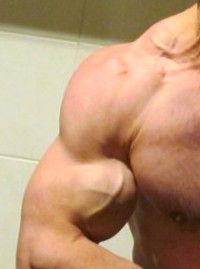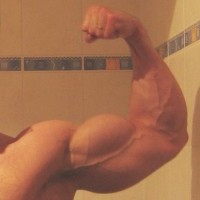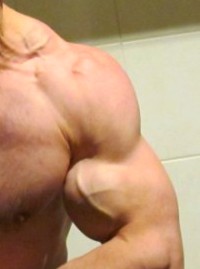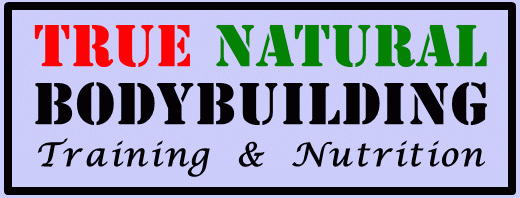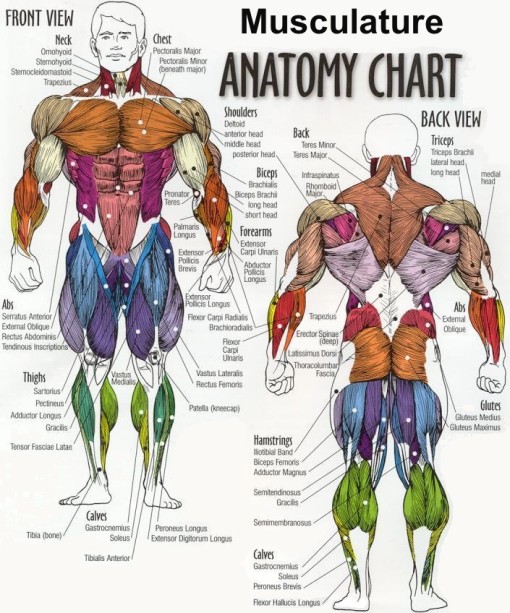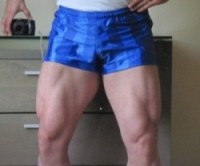Exercises
For each muscle group there exist many different exercises. However, it is very important to realize that not all of those exercises are equally suitable for stimulation your muscles to grow. Because it is very difficult to build muscle mass being a true natural bodybuilder, I strongly recommend you to only include those exercises in your training routine that are most suitable for building muscle mass. Any exercise that has not proven to be a real mass builder is not worth being performed.
On this page I will identify for each muscle group some of the most popular exercises of which I believe, based on over 20 years of training experience, are the best for building muscle mass. It is important, however, that you understand the criteria on which I have based my selection. Some of these criteria are explained in detail on my page about training.
Exercise Selection Criteria
- Back to the Basics. Many of the best exercises have proven their muscle building capabilities throughout more than 50 years of bodybuilding history and were used by all great bodybuilding champions, including the most recent ones. These basic exercises are usually simple to perform and represent very natural movements.
- Exercises performed with your own body weight or free weights (barbells and especially dumbbells) are by far the most effective as they usually allow very natural movements, full range of motion, and continuous tension. Machines and cable exercises should be avoided whenever possible, as their mechanical friction lowers the tension on the muscle during the down-phase of your reps, and they often limit the range of motion. The order of preference is: body weight, dumbbells, barbell, plate loaded machine, cable machine.
- Any exercise that doesn't allow you to perform quality reps, which comply with the principles of continuous tension and full range of motion, should be avoided. A good exercise should place about the same force on your muscle at any phase of the rep (bottom, up, top, down), and should allow the greatest possible range of motion (from longest muscle stretch to shortest muscle contraction).
- Being a natural bodybuilder, you need the strongest possible muscle growth stimulation you can get. Therefore isolation exercises, which allow you to put all your energy and intensity into one single target muscle group at a time, are preferred over compound power movements that involve many muscle groups simultaneously, and lead to exhaustion before maximum muscle growth stimulation of all involved muscles has occurred.
- If possible and if they can be performed with enough stability, one-sided exercises are preferred, as they always allow you to put more intensity into the targeted muscle group, because you can first fully concentrate on one side (left muscle) and then on the other side (right muscle).
So basically you need proven basic exercises that follow a very natural movement, which allow you to isolate the targeted muscle group as much as possible, which can be performed with free weights (if possible one-sided), and which allow you to do quality reps under continuous tension over the greatest possible range of motion. The equipment needed to do all these exercises is discussed on another page.
Recommended Exercises
For each muscle group, I list my personal favorite exercises, selected based on the criteria above. It's always good to have a pool of good exercises available for the same muscle, because varying the exercises in consecutive workouts always results in better muscle response. I do not describe all recommended exercises in full detail because most of them are well-known and described in detail on many other websites (see for example muscleandstrength.com, bodybuilding.com or ExRx.net). I do, however, discuss the critical aspects of the exercises to help you better understand how to perform them in the most effective way to build muscle mass.
Chest
For my pecs I prefer dumbbell flyes, dumbbell press, and barbell bench press (on smith machine). All three exercises can be performed on an incline bench of +22° (upper pecs), flat bench (middle pecs) or decline bench of -22° (lower pecs). When I use an incline bench, I keep the angle of the bench rather small to avoid that my front delts will do more work than my pecs. For the dumbbell press and flyes I am very careful not to lose the tension on my pecs at the top of the rep by bringing the weights too close to each other. For the same reason my grip is rather wide for the barbell bench press (which also reduces triceps involvement), and I avoid locking out my elbows at the top of the reps. In order to get a maximal stretch of the pecs at the bottom of the reps, I let the weights go really low for my dumbbell exercises and I fully extend my ribcage. Sometime I do hybrid dumbbell press/flyes in which I press the weight up and fly it back down, which gives a very powerful tension on the pecs during the down-phase of the reps. Sometimes I do a few sets of cable crossover, which completely isolate the pecs, or straight-arm dumbbell pullovers across the bench to finish my chest workout. Don't waste your time with machine exercises for your chest.
Abdominals
For my lower abs, I always do hanging or lying leg raises. For my upper abs I always do full range of motion crunches on a very steep decline bench of about -50°, where I arch my back as far as possible backwards (hollow back) at the bottom of the rep to fully stretch the abs, and arch my back as much as possible forwards (round back) at the top of the rep to fully contract the abs. During the crunch movement, my hip joints remain frozen, and the lowest part of my back remains horizontal throughout the whole rep. This is by far the most powerful exercise for the abs that I know. For both exercises I typically do 4 sets of 10 - 16 reps once per week. Don't waste your time doing million of repetitions of worthless exercises. Don't do any twists because they will damage your spine rather than giving you a lean, muscular waist.
Forearms
For my outer forearms, I do palms-down dumbbell or barbell wrist curls. When I do the wrist curls with a barbell I keep my arms straight, when I do them with dumbbells I keep my arms (elbows) in an angle of 90°. I always support my arms on a (preacher) bench. Sometimes I finish with a few sets of standing reverse barbell curls.
Shoulders
I used to do many standing dumbbell presses and seated barbell presses on the smith machine when I was a teenager. However, now I only do standing dumbbell lateral raises (side delts), bent-over dumbbell lateral raises (rear delts), and standing one-arm dumbbell front raises (front delts) because they really isolate the different parts of the deltoid muscle, while all press movements heavily involve the triceps muscles. When I do dumbbell raises to the side, I sometimes do them one-arm at a time. Dumbbell front raises I always do one-arm. I never alternate left and right because I feel this violates the principle of continuous tension by giving too much rest at the bottom of the rep. I also like to do my one-arm dumbbell lateral raises while lying on my side on an slightly inclined bench as this puts extra tension on the muscle at the bottom of the rep, when the delt is fully stretched. Don't do any cable exercises for your shoulders. Dumbbell raises are the greatest to develop your delts. I keep my arms slightly bent, and raise them rather high. Be careful not to give your delts any rest at the bottom of your reps. Occasionally I do one-arm dumbbell upright rows, which is a great exercise for the side delt and upper trapezius.
Upper trapezius
After my back or delts workout, I do one exercise for the upper part of my trapezius. I prefer one-arm dumbbell shrugs, because they really isolate the upper part of the trapezius and allow me to have the greatest possible range of motion.
Triceps
There are many good triceps exercises. My favorites are: parallel-bars or bench dips, close-grip EZ-bar bench press, EZ-bar triceps extension on a slight decline bench, lying dumbbells triceps extension, standing one-arm dumbbell triceps extension, and EZ-bar cable triceps pushdown. These exercises are all quite simple to perform correctly, and target the triceps muscle from all different angles. Pay attention that you don't forget the principle of full range of motion.
Upper and middle back
The best exercises for your upper back (lats) are: wide-grip pulldown behind the neck, mid-grip pulldown to the chest, V-bar pulldown to your middle, and kneeled one-arm cable pulldown. The latter one is definitely the best lat exercise that I know as it allows an incredible great range of motion, especially when you rotate your torso 90° during the movement. I used to do lots of pull-ups (chins) when I was a teenager. However, as they don't allow varying the weight easily, I stopped doing them.
The best exercises for your middle back (lower lats and trapezius) are: barbell row, T-bar row, one-arm dumbbell row, and seated cable row. Since my lower back injury I stopped doing bent-over barbell rows, T-bar rows, and seated cable rows, and replaced them by seated machine row, and lying T-bar row because these machines support the chest so that the stress comes off the lower back and legs. This way these exercises also become more of an isolation exercise rather than a compound power exercise, which allows you to put more of your energy in the targeted muscle group.
While training your upper and middle back, it is very important to realize that you are training your lats and trapezius, and not your biceps. Therefore you should focus on arching your back, pulling backward and downward your shoulders, and pulling together your shoulder blades during the up-phase of your reps, in order to obtain a full range of motion for your lats and trapezius.
Biceps
The best biceps exercises are: standing one-arm dumbbell curl, and seated incline dumbbell curl. I always rotate my wrists during the reps to maximize the range of motion of the biceps. Once in a while I do EZ-bar curls, concentration curls, hammer curls, or preacher curls. I always make sure that I don't lose the tension at the top of the rep, and I never alternate my dumbbell curls because I believe this violates the principle of continuous tension by giving too much rest at the bottom of the reps.
Hamstrings
For hamstrings I do lying leg curls, seated leg curls, standing leg curls, and glute-ham raises. For the leg curls it is important to explosively curl the weight up and to strongly contract the hamstrings for a moment at the top of the rep, before slowly lowering the weight in a controlled fashion. Your knees must be positioned exactly at the level of the rotation point of the machine, and the pads at the lower legs must be placed close to your feet.
Glute-ham raises put a very strong tension on the hamstrings in their extended position, and give a great muscle pump and soreness. They have a similar effect on the hamstrings as barbell deadlifts do, but they are harmless for the lower back as they don't put any stress on the intervertebral discs.
Lower back
The only very effective lower back exercise that is 100% safe for the back, is the hyperextension. Don't use too much weight, focus on the contraction of the muscles in the lower back. I would not recommend you to do any stiff-legged deadlifts or good-mornings as they can be very dangerous for damaging the intervertebral discs in your lower back, especially if you have already experienced lower back issues in the past.
Calves
The best exercise for the soleus muscle is the seated calf raise. The best exercise for the gastrocnemius muscle is the standing calf raise. The latter I prefer to do one leg at a time, only using my body weight or holding a dumbbell in one hand. The standing calf raise can also be performed on a machine, both legs at a time. However, I feel a better control of the muscle when I do each side separately without machine.
Quadriceps
The best exercises to build your quadriceps are the barbell squat, optionally performed using a smith machine, and the hack squat performed on a plate loaded hack squat machine. A potentially interesting variant of these may be the front barbell squat, optionally performed using a smith machine. In all these exercises you have to go down as deep as possible to obtain a full quadriceps stretch (full range of motion), and you have to avoid locking out your knees at the top of the movement to keep the tension on the muscle. It is very important always to press with your heels instead of your toes during all squat exercises. However, some people are not able to keep their heels on the floor when they squat deep, because their body structure doesn't allow it. These people can put a wooden plank of maximum 2 inches thick (e.g. 5 x 20 x 80 cm) under their heels, and adjust the angle of the feet plate of the hack squat machine. The belt squat is a good alternative for the barbell squat for people with a back injury.
The barbell deadlift and the machine leg press are rather compound power movements for the legs. They are great power movements that can add to the overall development of the legs. However, because they are compound exercises, lots of your energy gets lost in supporting muscles rather than the quadriceps. In fact they are often considered to be more effective for hamstring and glute development rather than quadriceps development. One other disadvantage of the leg press is its limited range of motion, as the quads don't get fully stretched at the bottom of the rep.
Leg extensions and sissy squats are not really suitable for building serious muscle mass, because they are rather unnatural movements that restrict the quadriceps to a limited range of motion. However, together with the one-leg bodyweight squat, they are the only quadriceps exercises that are completely safe for people with lower back problems, because the spine doesn't have to carry any weights. The one-leg bodyweight squat is a great exercise for at the end of your quadriceps workout and is best performed while holding onto something to improve your balance. Lunges are another popular leg exercise. However, as they cannot really be performed according to the principle of continuous tension, I don't consider them as very good mass builders, and therefore I do not recommend them.
After my lower back injury at the age of 18, I've used a lot of one-leg hack squats to develop my quadriceps. These put very little stress on the lower back, but put very high intensity on the quadriceps. By doing one leg at a time, I could put almost twice as much energy in each of my legs. After 8 sets of one-leg hack squats (4 sets of 10 reps for each leg) my quads had an incredible pump and were almost paralyzed from exhaustion. After the one-leg hack squats, I added an additional 4 sets of leg extensions or one-leg leg presses to squeeze out the last remaining drop of glycogen. This usually was enough for several days of deep muscle soreness.
Inner and outer thighs
The only exercise that really isolates the inner thighs is the thigh adductor machine. It is a natural movement for the inner thigh muscles, allowing full contractions and extensions of the muscles without sacrificing the principle of continuous tension.
The thigh abductor machine offers the best isolation exercise for the outer thighs and gluteus muscles. It is a great exercise to help define your outer thighs, and develop a pair of sexy, round glutes.
Conclusion
We all have limited time and energy, but we all want maximal results. Therefore, it is extremely important to do only those exercises, which guarantee the strongest possible muscle growth stimulation. I see too many inexperienced bodybuilders wasting their time and energy doing exercises that are simple not suitable for any serious muscle growth stimulation. It is much better to do one effective exercise than four ineffective.
Apart from doing the right exercises, it is of course also of crucial importance to perform them correctly. By following my guidance above, and by performing only quality sets according to the principle of continuous tension and full range of motion, it must be possible for everybody to generate sufficient intensity needed to stimulate some serious muscle growth.
If you are not familiar with the exercises that I've mentioned above or if you have no clue about how they are performed correctly, visit the website muscleandstrength.com which has a very good database of over 600 free exercise videos with instructions. Also download the detailed TNBB training routine.
